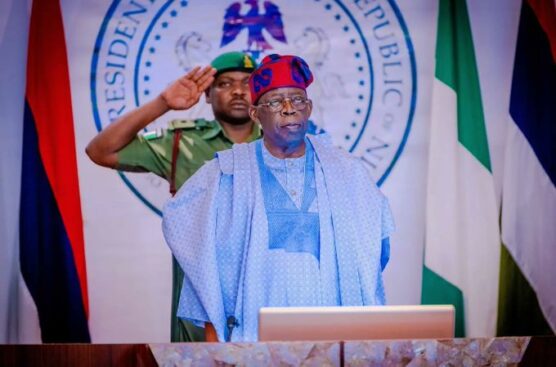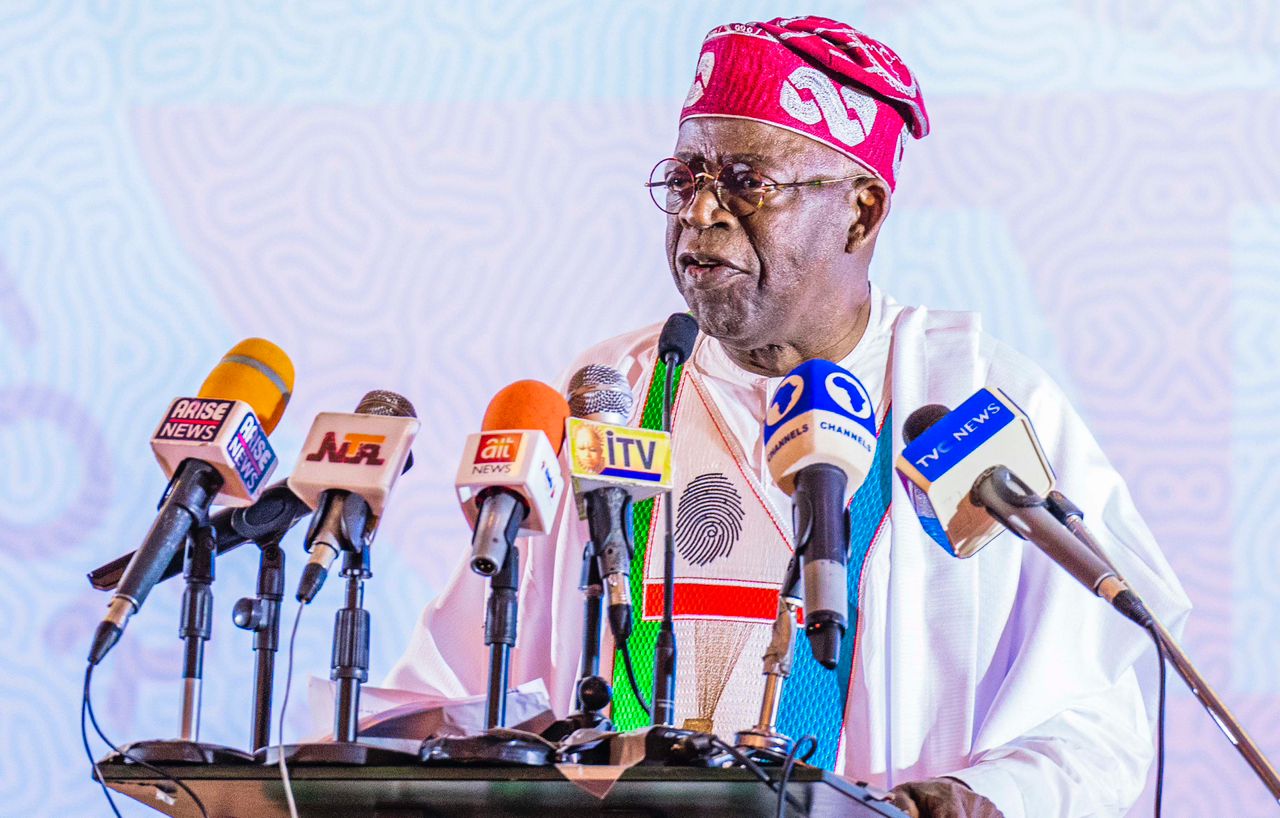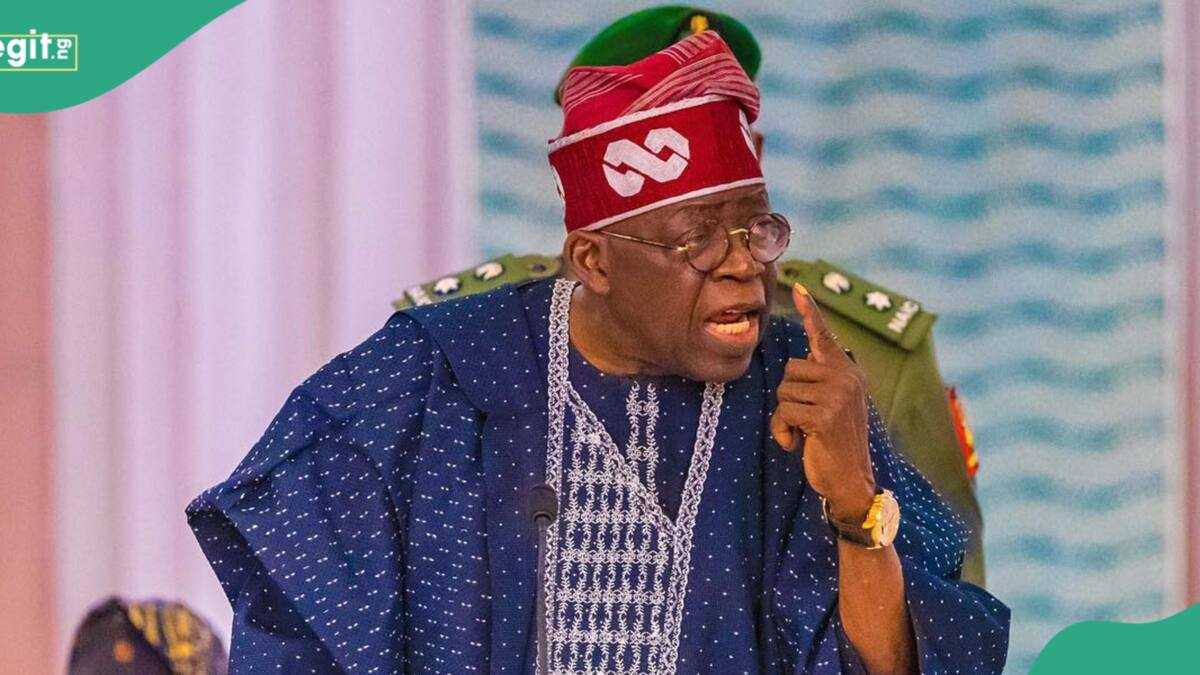ECOWAS @ 50: Tinubu, Gowon, others seek stronger ties amid shifting alliances, security woes
Critical stakeholders of the Economic Community of West African States (ECOWAS), yesterday, celebrated its 50th anniversary in Lagos, calling for stronger ties to tackle common challenges head-on.
The call came at the forum where Chairman of the Authority of ECOWAS Heads of State and Government and President of Nigeria, Bola Tinubu, former Head of State, General Yakubu Gowon, former Minister of External Affairs, Prof. Bolaji Akinyemi, Chairman of the African Union Commission (AUC), Mahmoud Ali Youssouf, represented by Amb. Selma Malika Haddadi, and President of the ECOWAS Commission, Dr Omar Touray, were among the key speakers.
The anniversary comes at one of the worst moments in recent years for ECOWAS, which was once internationally respected as a force for stability.
Three junta-led countries Mali, Burkina Faso and Niger quit the bloc earlier this year.
ECOWAS is also grappling with its security challenges, with jihadists exploiting strained relationships between members and gaining ground in the Sahel and Lake Chad region. Benin and Nigeria have experienced a wave of attacks in recent months. This is as the Sahel region was, in 2024, ranked the epicentre of global “terrorism” for the second straight year, accounting for more than half of deaths put down to terror attacks worldwide, according to the Global Terrorism Index published in March.
Speaking at the Nigerian Institute of International Affairs (NIIA) on Kofo Abayomi Street, Victoria Island, the same venue where the historic treaty establishing the regional bloc was signed by leaders of 15 West African nations on May 28, 1975, retired General Yakubu Gowon, aged 90, Nigeria’s former military leader and the only surviving co-founder of the organisation, was confident the trio would return to the ECOWAS fold.
“In recent years, we have witnessed the troubling resurgence of military coups in some of our member states. We thought that was over, but it seems as though personal ambition drives some people to do the wrong thing,” he said in an address to the gathering yesterday.
“Our sister nations that have chosen to exit the community may in time reconsider their decision, as the bonds of history, culture, and shared destiny remain unbroken. I am confident that with goodwill and sincere engagement, they will find a reason to return to the ECOWAS family, stronger, more united, and committed to our common vision for West Africa. I believe, sooner or later, they will come back,” Gowon added.
Shedding light on the birth of ECOWAS, he traced its origin to a conversation he had with the late Togolese leader, General Gnassingbé Eyadema, in the aftermath of Nigeria’s civil war. He recalled that the idea emerged during his visits across the sub-region to thank countries for their support and understanding during Nigeria’s civil war.
It was in the course of those diplomatic engagements, he said, that the vision for a united West African economic community began to take shape. “The idea started soon after the civil war when I went on a thank you visit to member States to thank them for their understanding and support, and was also engaged in entering into similar bilateral agreements with each President and head of State of the region then. But with General Gnassingbé Eyadema of Togo, we further discussed extending the idea beyond the bilateral level, to what is happening in some parts of the world, for instance in Europe, EEC, later EU, ECA in East Africa, Africa and Caribbean organisations.
“We both agreed to get to work at it and got our respective Ministers of Economic and External Affairs to produce a working document for consideration. Prof. Bayo Adedeji and Dr Arikpo from Nigeria and Mr Edem Kodjo and another from Togo and their staff set to work, getting other member-states involved to produce a working document for consideration.”
Speaking on the achievements of the bloc, he noted that the regional body has implemented various policies and programmes, protocols and operations to stabilise entities such as Liberia, Sierra Leone and Guinea-Bissau. He said they have achieved “Trade Liberalisation” by introducing policies to reduce trade barriers and promoting intra-regional trade, thus increasing trade among member-States and helping to promote economic growth and development.”
He lamented that despite some of the achievements, the bloc has, however, fallen short in certain areas. He stressed that the regional body is still faced with some formidable challenges such as security issues like terrorism, kidnapping, various criminal activities and various “activity of man’s inhumanity to man”.
Looking to the future, the former Head of State expressed a fervent hope for the bloc’s continued trajectory. “May ECOWAS continue to grow in strength, unity, and purpose,” he stated, articulating a vision of a more cohesive and effective regional entity.
Gowon concluded his stirring address by emphasising the enduring importance of the 1975 foundational spirit. “May the spirit of 1975 — of cooperation, of solidarity, and of hope — never be forgotten,” he urged.
Speaking at the symbolic event, Tinubu reaffirmed Nigeria’s steadfast commitment to regional integration, peace, and prosperity. “Nigeria has stood at the heart of ECOWAS since its inception,” Tinubu said. “For nearly five decades, we have remained a pillar of regional development, cooperation, and solidarity.”
Paying glowing tribute to General Gowon, ECOWAS’s only surviving founding leader, Tinubu described him as a visionary who laid the foundation of the bloc. “General Gowon helped lay the cornerstone of what has become a formidable institution for unity in West Africa,” he said.
Tinubu also highlighted Nigeria’s historical contributions to the regional body, including the deployment of professionals through the Technical Aid Corps, its leadership in promoting peace and democracy, and support for regional trade and integration.
“ECOWAS has emerged as a beacon of African unity. But unity must go beyond policy; our citizens must feel the impact of our decisions,” he said, urging member states to prioritise implementation.
He emphasised investing in youth and women, whom he described as central to the region’s future. “We must deliberately invest in education, entrepreneurship, healthcare, and leadership opportunities. Their success is key to the future of ECOWAS,” Tinubu added.
Other priorities outlined by the Nigerian leader include digital transformation, infrastructure development, and food security, which he said are vital for sustainable growth.
“As we mark this Golden Jubilee, let us recommit to the ideals that brought us here with courage, clarity, and determination,” Tinubu charged. “This is your community. Your hands built it, your resilience sustained it, and your dreams will define its future.”
In his remarks, Mahmoud Ali Youssouf of the African Union Commission noted ECOWAS’s critical role amid global and regional upheavals.
“ECOWAS’s role as first responder to political crises has solidified its standing, not only as a cornerstone of West Africa’s stability but as a vital pillar within Africa’s broader institutional framework,” he said.
He praised the bloc’s achievements in economic integration, urging stakeholders to double down on solidarity and boldly chart the path for the next 50 years. “This journey reflects the continent’s capacity to transcend colonial borders and forge collective solutions.”
Prof. Akinyemi praised the resilience of ECOWAS, noting that its survival over five decades has defied early scepticism rooted in linguistic, political, and institutional differences.
“There were doubts that ECOWAS would last this long, but here we are. Even nations that have existed for 200 years still face challenges. Yet, today, one can travel by road to Ghana or the Ivory Coast with ease. That is a major achievement,” he said.
Akinyemi also lauded the regional body’s contribution to intra-African trade and integration, stressing that ECOWAS has bridged colonial divisions and unified Anglophone and Francophone countries under one regional vision.
President of the ECOWAS Commission, Dr Omar Touray, described the bloc’s journey as one of resilience, unity, and purpose.
He said: “Over five decades, ECOWAS has facilitated free movement, advanced intra-African trade, and built critical infrastructure to drive economic growth and social cohesion.”
Touray acknowledged persistent challenges, including terrorism, climate change, unconstitutional regime changes, poverty, and economic disparity, but expressed confidence that with unity and shared identity, the region can overcome them.
Meanwhile, former President Muhammadu Buhari, in a letter to President Tinubu, cited a routine medical check-up in the United Kingdom as the reason for his absence from the celebration.
“Regrettably, I am currently in the UK undergoing routine medical check-ups and therefore unable to attend this historic event,” Buhari wrote.
Buhari congratulated ECOWAS on its milestone anniversary and praised the vision of its founding fathers. He also commended General Gowon for his pivotal role in birthing the organisation.
ECOWAS was established on May 28, 1975, through the signing of the Treaty of Lagos by 15 West African countries. Its founding vision was to promote economic integration, regional cooperation, and development in the post-colonial era, overcoming linguistic, ideological, and political divides.
ECOWAS originally included both Anglophone and Francophone nations, along with Lusophone Guinea-Bissau, united under the goals of free movement of people and goods, a common market, and collective peace and security mechanisms.
Parts of the achievements of the commission include free movement of people, trade and economic integration, conflict resolution & peacekeeping: ECOWAS created ECOMOG, its military wing, which has intervened in conflicts in Liberia, Sierra Leone, Guinea-Bissau, and The Gambia.
It has also helped to promote democratic governance by sanctioning and diplomatically intervening against unconstitutional regime changes, and upholding democratic norms.
ECOWAS is however confident that Mali, Burkina Faso and Niger will return to the regional bloc, Nigerian Foreign Minister Yusuf Tuggar said on Wednesday.
“Much has been said of the departure of three of our member states, to the point that it distracts from the significant achievements of our community. But democracy is a process, not an event,” Tuggar said at the 50th anniversary ceremony of ECOWAS in Nigeria.
Mali, Burkina Faso and Niger – the Alliance of Sahel States (AES) – announced its intent to withdraw from ECOWAS last year, citing dissatisfaction with sanctions and perceived foreign influence, following military coups in the three Sahel countries.
The three officially withdrew from ECOWAS on January 29, 2025, leaving the bloc with 12 members. ECOWAS set a six-month transition from January 29, 2025, to July 29, 2025, to encourage the AES to reconsider the exit.
The AES was created as a mutual defence pact in September 2023 that was formalised into a confederation on July 6, 2024, signing a treaty to deepen the defence pact and expand cooperation in defence, economic and social sectors.
The military-led governments have taken bold steps to redefine their international alignment, including recent withdrawals from ECOWAS and the International Organisation of La Francophonie (OIF). The AES has also announced plans to deploy a joint force of 5,000 troops to counter the growing threat of terrorism in the region. Additional initiatives include the launch of a common passport and a joint web-based television channel aimed at countering disinformation.











